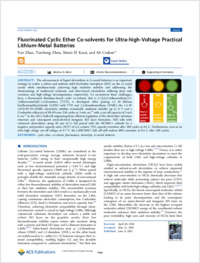Fluorinated Cyclic Ether Co-solvents for Ultra-high-Voltage Practical Lithium-Metal Batteries
DOKPE
- Zhao, Yan ORCID University of Fribourg
- Zhou, Tianhong ORCID University of Fribourg
- El Kazzi, Mario ORCID Electrochemistry Laboratory, Paul Scherrer Institute, Switzerland
- Coskun, Ali ORCID University of Fribourg
- 09.06.2022
Published in:
- ACS Applied Energy Materials. - American Chemical Society (ACS). - 2022, vol. 5, no. 6, p. 7784-7790
Electrical and Electronic Engineering
Materials Chemistry
Electrochemistry
Energy Engineering and Power Technology
Chemical Engineering (miscellaneous)
cyclic ether
co-solvent
fluorination
electrolyte
Li-metal batteries
English
The advancement of liquid electrolytes in Li-metal batteries is an important
strategy to realize a robust and uniform solid electrolyte interphase (SEI) on the Li metal
anode while simultaneously achieving high oxidative stability and addressing the
shortcomings of traditional carbonate and ether-based electrolytes suffering from side
reactions and high-voltage decomposition, respectively. To circumvent these challenges,
here, a fluorinated dioxolane-based cyclic co-solvent, that is 2-(2,2,2-trifluoroethoxy)-4-
(trifluoromethyl)-1,3-dioxolane (TTD), is developed. After pairing 1.5 M lithium
bis(fluorosulfonyl)imide (LiFSI) with TTD and 1,2-dimethoxyethane (DME), the 1.5 M
LiFSI-8TTD-2DME electrolyte exhibits remarkable oxidation stability up to 6 V and a
Coulombic efficiency of 99.4% over 210 cycles at 3 mA cm−2 with a cut-off capacity of 3 mA
h cm−2 in the Li|Cu half-cell originating from efficient regulation of the electrolyte solvation
structure and consequent anion-derived inorganic SEI layer formation. Full cells with
advanced electrolytes, using 20 μm of Li foil paired with the NCM811 cathode by a
negative and positive capacity ratio (N/P) of 2.5, achieve 75% capacity retention after 160 cycles at 0.5 C. Furthermore, even at an ultra-high charge cut-off voltage of 4.7 V, the Li|NCM811 full cell still realizes 80% retention at 0.5 C after 100 cycles.
strategy to realize a robust and uniform solid electrolyte interphase (SEI) on the Li metal
anode while simultaneously achieving high oxidative stability and addressing the
shortcomings of traditional carbonate and ether-based electrolytes suffering from side
reactions and high-voltage decomposition, respectively. To circumvent these challenges,
here, a fluorinated dioxolane-based cyclic co-solvent, that is 2-(2,2,2-trifluoroethoxy)-4-
(trifluoromethyl)-1,3-dioxolane (TTD), is developed. After pairing 1.5 M lithium
bis(fluorosulfonyl)imide (LiFSI) with TTD and 1,2-dimethoxyethane (DME), the 1.5 M
LiFSI-8TTD-2DME electrolyte exhibits remarkable oxidation stability up to 6 V and a
Coulombic efficiency of 99.4% over 210 cycles at 3 mA cm−2 with a cut-off capacity of 3 mA
h cm−2 in the Li|Cu half-cell originating from efficient regulation of the electrolyte solvation
structure and consequent anion-derived inorganic SEI layer formation. Full cells with
advanced electrolytes, using 20 μm of Li foil paired with the NCM811 cathode by a
negative and positive capacity ratio (N/P) of 2.5, achieve 75% capacity retention after 160 cycles at 0.5 C. Furthermore, even at an ultra-high charge cut-off voltage of 4.7 V, the Li|NCM811 full cell still realizes 80% retention at 0.5 C after 100 cycles.
- Faculty
- Faculté des sciences et de médecine
- Department
- Département de Chimie
- Language
-
- English
- Classification
- Analytical chemistry
- License
-
Rights reserved
- Open access status
- green
- Identifiers
-
- DOI 10.1021/acsaem.2c01261
- ISSN 2574-0962
- Persistent URL
- https://folia.unifr.ch/unifr/documents/325170
Statistics
Document views: 167
File downloads:
- acsaem.2c01261_0: 366
